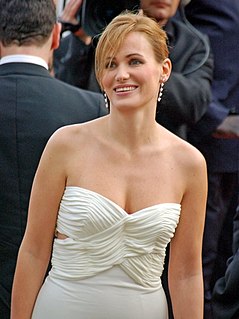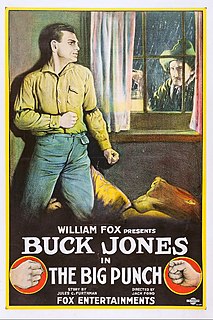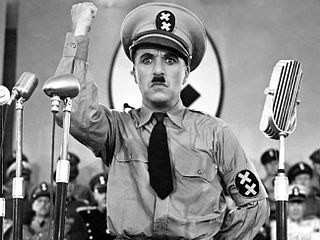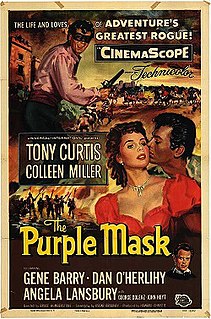
Judith Godrèche is a French actress and author. She has appeared in more than 30 films.
Poisoning the well is a type of informal fallacy where irrelevant adverse information about a target is preemptively presented to an audience, with the intention of discrediting or ridiculing something that the target person is about to say. Poisoning the well can be a special case of argumentum ad hominem, and the term was first used with this sense by John Henry Newman in his work Apologia Pro Vita Sua (1864). The origin of the term lies in well poisoning, an ancient wartime practice of pouring poison into sources of fresh water before an invading army, to diminish the attacking army's strength.

Ridicule is a 1996 French film set in the 18th century at the decadent court of Versailles, where social status can rise and fall based on one's ability to mete out witty insults and avoid ridicule oneself. The story examines the social injustices of late 18th-century France, in showing the corruption and callousness of the aristocrats.
An association fallacy is an informal inductive fallacy of the hasty-generalization or red-herring type and which asserts, by irrelevant association and often by appeal to emotion, that qualities of one thing are inherently qualities of another. Two types of association fallacies are sometimes referred to as guilt by association and honor by association.

Patrice Leconte is a French film director, actor, comic strip writer, and screenwriter.
The Critics' Choice Movie Award for Best Foreign Language Film is one of the awards given to people working in the motion picture industry by the Broadcast Film Critics Association.
The 1st San Diego Film Critics Society Awards, given by the San Diego Film Critics Society on 28 December 1996, honored the best in film for 1996.
The 68th National Board of Review Awards, honoring the best in filmmaking in 1996, were announced on 9 December 1996 and given on 9 February 1997.
The Fantasticar is a fictional flying car appearing in American comic books published by Marvel Comics. The vehicle is depicted as the primary mode of transportation for the fictional Marvel comics superhero team, the Fantastic Four. Several versions have been created by Mister Fantastic, leader of the team.

Black and White in Color is an Ivorian 1976 war film and black comedy directed by Jean-Jacques Annaud in his directorial debut. It depicts French colonists at war with the Germans in Central Africa during World War I, and is set in the then German colony of Kamerun. The film adopts a strong antimilitaristic point of view, and is noteworthy for ridiculing the French side even more harshly than their German counterparts.

Waris Jari Hantu is a 2007 Malaysian horror film directed by Shuhaimi Baba. The film won Rusdi Ramli, one of its lead actors, The Best Actor award at the 20th Malaysia Film Festival.
The 22nd César Awards ceremony, presented by the Académie des Arts et Techniques du Cinéma, honoured the best French films of 1996 and took place on 8 February 1997 at the Théâtre des Champs-Élysées in Paris. The ceremony was chaired by Annie Girardot and hosted by Antoine de Caunes. Ridicule won the award for Best Film.

The Big Punch is a 1921 American western film directed by John Ford. It is not known whether the film currently survives, which suggests that it is a lost film. In France, the film was known under the title Un homme libre.

A parody ; also called a spoof, send-up, take-off, lampoon, play on (something), caricature, or joke, is a work created to imitate, make fun of, or comment on an original work—its subject, author, style, or some other target—by means of satiric or ironic imitation. As the literary theorist Linda Hutcheon puts it, "parody ... is imitation, not always at the expense of the parodied text." Another critic, Simon Dentith, defines parody as "any cultural practice which provides a relatively polemical allusive imitation of another cultural production or practice". Parody may be found in art or culture, including literature, music, animation, gaming, and film.
The Central Board of Film Censors is a film censorship board and rating system body under the Ministry of Information & Broadcasting for the Government of Pakistan. It is tasked with regulating the public screening of films under the provisions of the Motion Picture Ordinance, 1979. The head offices are located in Islamabad, while two regional offices are located in Karachi and Lahore.

The 1998 United States Senate election in Vermont was held November 3, 1998. Incumbent Democratic U.S. Senator Patrick Leahy won reelection to a fifth term.
Mont-Dragon is a 1970 French film directed by Jean Valère, starring Jacques Brel, Françoise Prévost, Paul le Person and Catherine Rouvel, with a screenplay by Robert Margerit.

The Purple Mask is a 1955 American swashbuckler film directed by H. Bruce Humberstone starring Tony Curtis and set in 1803 France.
The following lists events that happened during 2012 in Kazakhstan.










